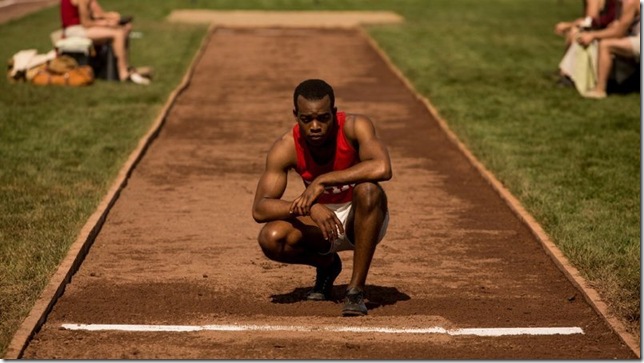As expected, Stephen Hopkins’ biopic of Jesse Owens is full of suspenseful action on tracks and fields, Olympic and otherwise. The refreshing surprise of Race is that it’s a more important film than it needed to be regarding ethics, morality, identity, politics, history and, yes, race.
Even while somewhat conforming to a crowd-pleasing triumphalist formula, Race lives up to both meanings of its boldface title, filling its 134 minutes with insights about white privilege and solidarity of the oppressed (while watching the film, I thought several times of Martin Niemoller’s poem “First they came…”). A fire of rage and discontent burns even through Owens’ gold medals — micro victories in a macro environment of domestic segregation and looming international genocide that Hopkins, to his dogged and even anti-commercial credit, provides equal shrift.
Race is set during the four years between Owens’ (Stephan James) acceptance at Ohio State University and his history-making performances at 1936 Olympic Games in Berlin: bread lines at home, Nazism abroad. We get the requisite training montages and trailer-ready bromides, but Holden, along with screenwriters Joe Shrapnel and Anna Waterhouse, respect the interesting times of their runner’s ascent. They quickly expand the story’s scope to include potent scenes in the smoke-filled offices of the U.S. Olympic Committee in New York, where a clutch of gray-haired, well-manicured WASPs must decide if the U.S. should pull out of the ’36 Games to protest the Third Reich’s treatment of Jews and gypsies.
Jeremy Irons’ deal-making diplomat Avery Brundage believes the best way to protest Nazism is to send their athletes to Germany and bring them home with gold medals. William Hurt’s Jeremiah Mahoney leads the opposing contingent, believing that a refusal to participate provides the U.S. with the moral high ground. Like many debates in Race, there is no right answer. Both arguments are equally convincing, and attentive audiences may find themselves vacillating healthily between them.
Owens continues to face moral quandaries that affect his race and the races, all the while building trust and empathy with his white coach, Larry Snyder (a sensational Jason Sudeikis), a former runner whose career was cut short. If the Olympic Games withdrawal controversy is the movie’s civic-minded brain, then the Owens-Snyder relationship is its emotional heart, with each man enlightening the other on matters their races prevent them from fully understanding. Hopkins shows us that even a progressive thinker like Snyder exudes subtle privilege and control over his star athlete: “You belong to me,” he asserts in their first meeting. He means that Owens’ entire tenure at Ohio State should be focused on track and field, but it sounds awfully like a plantation master informing his chattel.
Owens is used to this attitude, of course. The Midwest was then a nest of racism, and we see Owens enduring bigotry from everybody, from the pasty football jocks to the track judges who dock him a crucial fragment of a second to, well … Adolf Hitler, who refuses to meet with black Olympic victors. Race hammers this theme throughout the movie to the point of redundancy, but it’s a necessary redundancy, because it reveals the constancy of racism in Jim Crow America.
The movie’s numerous electrons of intolerance eventually coalesce in the nucleus of the sweeping Olympic Games climax, where Jewish-American athletes are barred from participation and sexist insults are leveled at Leni Reifenstahl (Carice van Houten), of all people, by a steely-eyed Joseph Goebbels (Barnaby Metschurat). As one of the most complicated artists in film history, Reifenstahl deserves her own biopic, and these internecine squabbles within the Reich may be one of the film’s few missteps.
Race burnishes Reifenstahl’s reputation and presents her as one of many minority victims rather than a willing propagandist, but even this is an admirable mistake. Who would have thought a Jesse Owens biopic would contain so much subtitled German dialogue and a significant supporting role from a pioneer of film grammar?
Despite Owens’ successes, the Nazis’ future atrocities hang over everything, as they probably should. Hopkins and his screenwriters realize the hindsight-aided naivete of Avery Brundage scolding Goebbels in 1935 that “you’ve got to clean up your act!”
Race takes as much pleasure as it possibly can from Goebbels’ and Hitler’s scowling reactions to Owens’ wins, and in a key moment toward the end, Reifenstahl and her team proudly uncover the cameras that Hitler ordered to be silenced, lest another achievement by the black man be projected in cinemas all over the world. It’s cold comfort knowing the Holocaust that loomed around the corner, but Hopkins’ film is thankful for any victories, large and small — whether they are of mind, body or spirit.
RACE. Director: Stephen Hopkins; Cast: Stephan James, Jason Sudeikis, Jeremy Irons, Amanda Crew, William Hurt, Carice van Houten, Barnaby Metschurat; Distributor: Focus; Rating: PG-13; Opens: Friday at most area theaters
